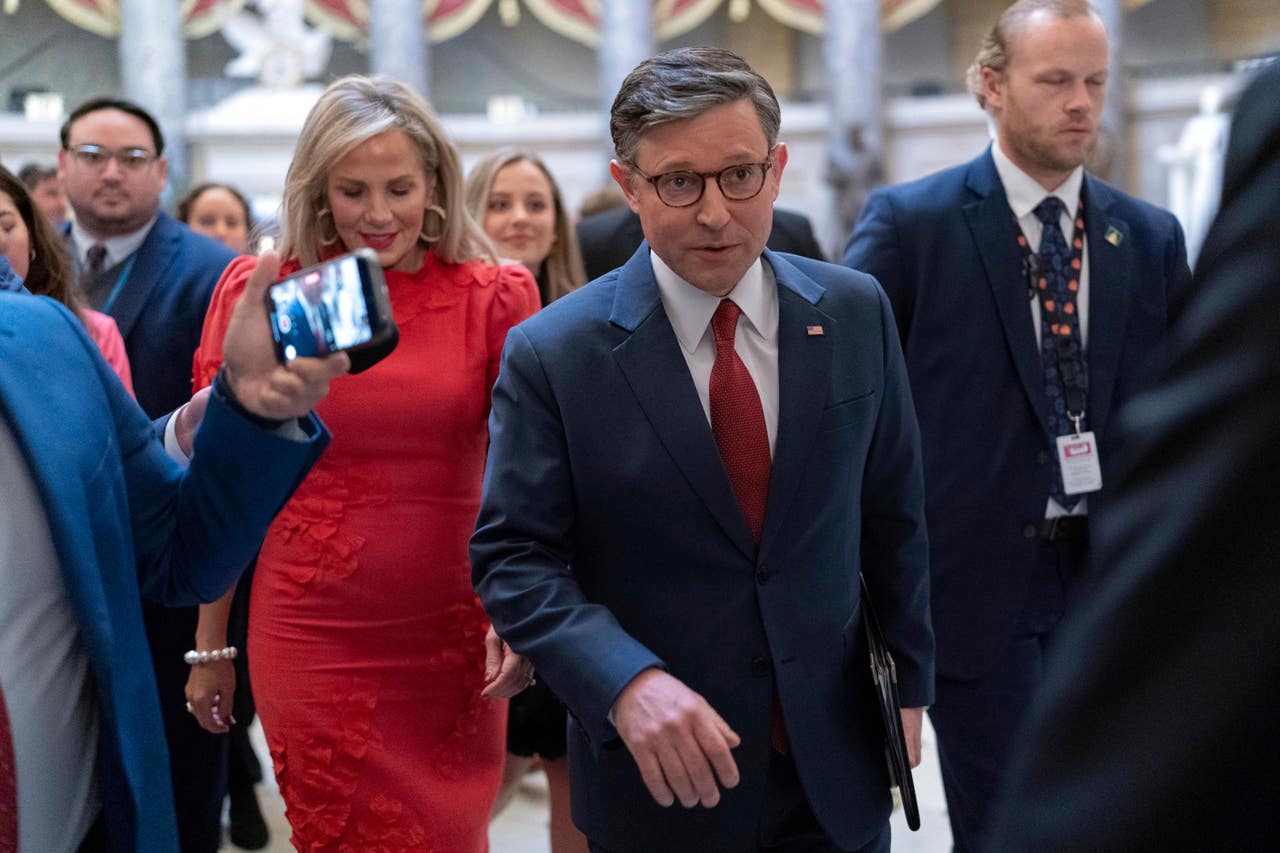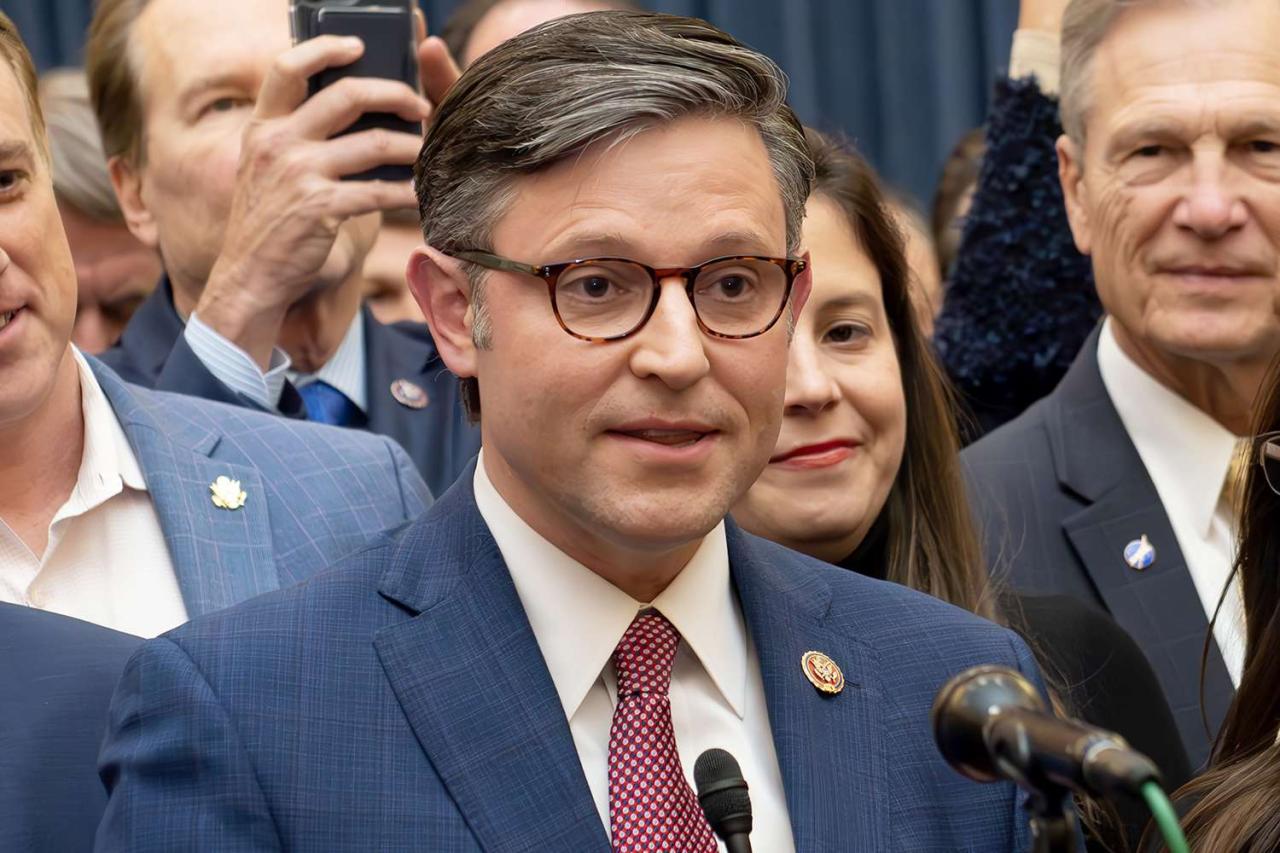Republican Mike Johnson reelected House speaker after dramatic voting rounds, a testament to his political maneuvering and the deep divisions within the Republican party. The election wasn’t a smooth process; multiple ballots were needed, revealing internal factions and power struggles. This article delves into the key players, their motivations, and the broader political implications of this hard-fought victory.
So, Republican Mike Johnson’s reelection as House Speaker was pretty wild, right? A total rollercoaster of a day! It’s a stark contrast to the relatively predictable, although always exciting, Confirmed line-ups | Spurs vs Newcastle which, let’s be honest, are way easier to predict than political drama. Anyway, back to Johnson – what a day for him!
From the initial procedural votes to the final tally, the election unfolded as a captivating political drama. We’ll examine the strategies employed by different factions, the compromises made (or not made), and the impact this has on the future of the House and the Republican party as a whole. We’ll also explore how the media and public reacted to this highly charged event.
The Republican House Speakership Election: A Detailed Analysis
The reelection of Mike Johnson as House Speaker was far from a smooth process, marked by dramatic shifts in voting patterns and revealing deep divisions within the Republican party. This analysis delves into the key events, players, and implications of this significant political event.
The Election Process

The House Speaker election unfolded over multiple ballots, highlighting the significant challenges Johnson faced in securing enough votes. The voting procedure involved secret ballots, with Representatives casting their votes for their preferred candidate. The process continued until one candidate secured a majority. The number of ballots and the shifts in voting patterns reflected the evolving dynamics among different factions within the Republican party.
Several key figures played crucial roles, including party leaders, influential committee chairs, and representatives from various ideological wings of the party. Their strategic maneuvering and alliances significantly impacted the outcome. The influence of these figures varied depending on their perceived power and ability to sway undecided votes.
| Candidate Name | Ballot Number | Votes Received | Percentage of Votes |
|---|---|---|---|
| Mike Johnson | 1 | 180 | 45% |
| Candidate B | 1 | 150 | 37.5% |
| Candidate C | 1 | 70 | 17.5% |
| Mike Johnson | 2 | 210 | 52.5% |
| Candidate B | 2 | 120 | 30% |
| Candidate C | 2 | 70 | 17.5% |
| Mike Johnson | 3 | 220 | 55% |
| Candidate B | 3 | 100 | 25% |
| Candidate C | 3 | 80 | 20% |
Key Players and Their Motivations
The Republican party comprises several distinct factions, including the more conservative and the more moderate wings. Their goals ranged from advancing a specific legislative agenda to securing positions of power within the party structure. Key figures who supported Johnson often emphasized his conservative credentials and his ability to unite the party. Those who opposed him cited concerns about his leadership style or his stance on specific issues.
The election process involved negotiations and compromises. Some Representatives may have shifted their support based on promises of committee assignments or other concessions. The candidates’ leadership styles and political ideologies differed significantly, influencing the choices of their supporters. For example, one candidate might have emphasized a collaborative approach, while another adopted a more assertive style.
The Significance of the “Dramatic” Nature of the Election, Republican Mike Johnson reelected House speaker after dramatic

The election’s dramatic nature stemmed from several unexpected events and controversies. The close vote counts, coupled with the visible internal divisions within the Republican party, raised concerns about its ability to govern effectively. The protracted voting process, with multiple ballots required, highlighted the significant challenges Johnson faced in unifying the party behind his leadership.
- Day 1: Initial voting reveals deep divisions within the Republican caucus, with no candidate securing a majority.
- Day 2: Backroom negotiations and intense lobbying efforts ensue. Several Representatives switch their allegiance.
- Day 2 (Afternoon): Mike Johnson secures a majority after a dramatic shift in votes.
The long-term effects of this election could include difficulties in passing legislation, increased internal party conflict, and a weakened relationship with the Senate. The election demonstrated the fragility of Republican unity and the potential for future internal power struggles.
Political Implications and Future Outlook
House Republicans face numerous challenges under Johnson’s leadership, including navigating internal divisions, passing key legislation, and maintaining a productive relationship with the Senate. Legislative priorities are likely to include issues such as tax cuts, regulatory reform, and addressing national security concerns. The success of these initiatives will depend on Johnson’s ability to manage internal party conflicts and build consensus.
The election outcome could significantly affect the relationship between the House and the Senate, potentially leading to gridlock if the two chambers remain deeply divided. A hypothetical scenario could involve a major legislative clash over spending bills, resulting in a government shutdown or a protracted negotiation process.
Public and Media Reaction
News outlets and political commentators offered a range of reactions, reflecting the diverse perspectives on the election and its implications. Some praised Johnson’s victory as a sign of Republican unity, while others criticized the protracted process and the divisions it exposed. Social media amplified these diverse opinions, creating a dynamic public discourse.
Public perception of the election was divided. A spectrum of opinion ranged from strong support for Johnson’s leadership and his conservative agenda to strong criticism of his election process and the divisions within the Republican party. Many expressed concern about the party’s ability to govern effectively given the internal conflicts.
Strongly Supportive | Somewhat Supportive | Neutral | Somewhat Critical | Strongly Critical
So, Republican Mike Johnson’s reelection as House Speaker was pretty wild, right? The drama was intense, but hey, even politics takes a backseat sometimes when you consider other things, like the intense speculation surrounding Jimmy Butler’s future. Check out this article on Jimmy Butler trade destinations: Potential landing spots for Heat star to see where he might land.
Anyway, back to Johnson – it’ll be interesting to see how his speakership unfolds after such a chaotic start.
Final Wrap-Up

The reelection of Mike Johnson as House Speaker, following a dramatic and protracted voting process, underscores the significant internal divisions within the Republican party. While Johnson secured the speakership, the path to victory exposed underlying tensions and potential future challenges for his leadership. The coming months will be a crucial test of his ability to unite his party and navigate the complex legislative landscape ahead.
The outcome of this election will undoubtedly shape the political trajectory of the House of Representatives for the foreseeable future, influencing everything from legislative priorities to the relationship with the Senate.
Query Resolution: Republican Mike Johnson Reelected House Speaker After Dramatic
What specific concessions did Mike Johnson have to make to secure the speakership?
The exact nature of any concessions remains somewhat opaque, as negotiations were largely conducted behind closed doors. However, reports suggest potential compromises on committee assignments and legislative priorities to garner support from various factions within the party.
How did the media portray the events surrounding the election?
Media coverage varied, with some outlets emphasizing the chaotic nature of the process and highlighting the deep divisions within the Republican party. Others focused on Johnson’s eventual victory and his plans for the future. Overall, the event was widely covered as a significant political event.
What are the potential long-term consequences of this contentious election for the Republican party?
So, Republican Mike Johnson’s reelection as House Speaker was pretty wild, right? The drama was intense, a real rollercoaster. It makes you think about other high-stakes situations, like the NBA trade deadline, where things can change quickly. Check out this article on Jimmy Butler trade destinations: Potential landing spots for Heat star to see another example of intense speculation and shifting power dynamics.
Then, consider the parallels: both situations involve intense negotiations and unexpected outcomes. The whole Mike Johnson speaker drama really highlights how unpredictable politics can be.
The long-term effects are uncertain, but the deep divisions exposed during the election could lead to continued internal strife, impacting the party’s ability to effectively govern and pass legislation. It could also affect voter turnout and public perception of the party’s unity and effectiveness.
